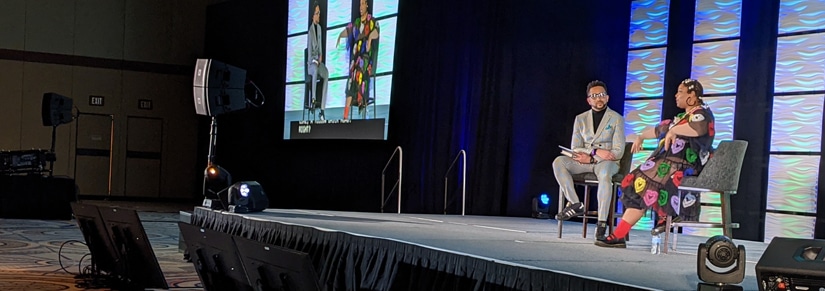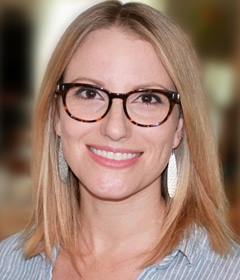Cullors Keynote Explores Crucial Role of the Modern Abolitionist
Upon hearing the word “abolition,” some think about how Harriet Tubman risked her life freeing enslaved people as an operator of the Underground Railroad. Others call to mind Ava DuVernay’s 2016 film, “13th,” which questions whether slavery was truly abolished via amendment or continues today in the form of mass incarceration.
But activist Patrisse Cullors, author of “An Abolitionist’s Handbook: 12 Steps to Changing Yourself and the World,” said abolition can be defined even more broadly.
“Abolition is about being willing to have courageous conversations — showing up not just for courageous conversations interpersonally, but also having the courageous conversations that call out harm and violence that’s happening at the local and global level,” Cullors told ACUI 2022 attendees during an all-conference keynote session on Monday, March 14.
She said the concept of abolition is vital in moving away from an economy of punishment and toward an economy of care.
“In the current system that we live in, in the society that we live in, the only way that we hold people accountable is through punishment, revenge, and vengeance,” Cullors said. “That happens at our religious institutions, schools, and obviously at the highest level with the criminal legal system.”

Those on societal margins — including Black people, the LGBTQ+ community, and women — bear the brunt of that punishment, she said. That’s where abolitionism comes in, helping us reorient ourselves to a culture that values human beings over profits.
As a long-time educator, artist, and activist based in Los Angeles, Cullors knows from experience the power of abolition in action. In addition to #BlackLivesMatter, she has spearheaded several organizations, including Dignity and Power Now, Justice-LA, and Reform LA Jails.
“I’ve had the privilege, for half of my life, to help transform the criminal legal system in my city and in my county,” she said. “At the height of the Los Angeles jailing system, there were 21,000 human beings in that system. And we worked hard to reallocate dollars out of incarceration and policing and into social services.”
“We had to convince not just elected officials but also each other that people deserve housing, people deserve access to healthy food, people deserve access to adequate public education,” she continued.
It all started 15 years ago when the County of Los Angeles Board of Supervisors moved to build two new jails that would cost between $3.5 billion and $7.5 billion. In response, Cullors and other advocates contacted elected officials, protested, and eventually formed Justice-LA.
In September 2017, the activists created an art installation featuring 200 steel jail beds — a hard-hitting visualization of where taxpayer dollars would eventually lie.
“We showed up with 300 people from across all of Los Angeles County: Black folks, brown folks white allies, queer folks, trans folks, people with disabilities, students,” Cullors said. “We showed up to that meeting, and we shut down the streets for almost eight hours with no arrests, and our plea was, ‘Do not build these jails. Put this money into our communities.’”
The group went on to offer alternatives to incarceration, collect signatures, and push forward progressive ballot measures. By 2020, Justice-LA had convinced the County of Los Angeles Board of Supervisors to vote against plans to build two jails.
“From 2017 to 2020, we watched our entire county board of supervisors transform their relationship to the people,” Cullors said. “And do you want to know why? Because we were persistent. We never wavered on our abolitionist’s vision.”
In that sense, she said, abolition presents a way forward; a place where the people can anchor themselves, not just to dismantle old systems but to imagine new ones tied to an economy of care rather than punishment.
“If you come to Los Angeles County today, you’ll hear a very different tone — not just from our elected officials, but also from our local media and the people on the ground,” Cullors said. “The vision of abolition is a future where all of our needs are met…where we get to heal not just ourselves but the entire collective.”

